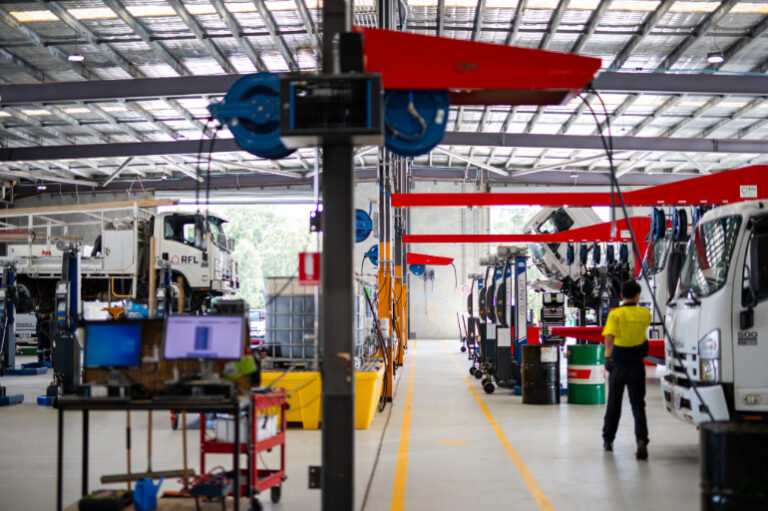The “Future of Trucking Report” by Isuzu Australia outlines the critical role of maintenance management in ensuring the efficient, safe, and compliant operation of trucks across the country. The report highlights that regular, effective, and timely maintenance is crucial for sustaining the operational integrity of vehicles, especially given Australia’s demanding conditions of long distances, variable climates, and rugged road infrastructure. A well-maintained fleet not only enhances safety but also improves efficiency, minimises downtime, and ensures compliance with national regulations.
According to the report, Australian fleet operators hold onto their trucks for an average of six years, making regular maintenance essential to optimise vehicle lifespan and performance. Scheduled servicing is a key component of maintenance planning, with 41% of respondents favouring tailored servicing agreements that offer flexibility through upfront or instalment-based payments. In addition, 25% of businesses prefer capped-price servicing packages, which provide cost certainty over time.
Chain of Responsibility: Compliance Awareness and Action
The Chain of Responsibility (CoR) remains a fundamental compliance obligation under the Heavy Vehicle National Law (HVNL) in Australia, ensuring that every party involved in the transport supply chain is accountable for safety standards. CoR regulations require businesses to identify, assess, and mitigate risks associated with transport activities to the greatest extent possible. Encouragingly, 70% of surveyed businesses reported having policies in place or actively developing them to comply with CoR regulations, demonstrating a strong commitment to safety and legal obligations.
However, the report reveals a concerning gap: 30% of operators are either unaware of CoR requirements or have not begun developing the necessary policies to ensure compliance. This gap is particularly pronounced among owner-driver businesses, which represent 55% of respondents and show the lowest levels of CoR awareness and policy development.
Major Repairs: Preference for OEM Workshops
When it comes to major repairs, the report indicates a clear preference for Original Equipment Manufacturer (OEM) dealerships, with 42% of respondents opting for these authorised workshops over independent repairers (34%) or on-site maintenance arrangements (24%). The top reasons for this preference include quality of workmanship (57%), timely service (55%), and availability of parts (54%). These factors are particularly important for large fleets, where minimising downtime and ensuring vehicle reliability are critical.
The focus on using OEM services extends beyond major repairs to encompass general maintenance. The report notes that using genuine OEM parts is widely regarded as essential for ensuring compliance, enhancing vehicle safety, and maintaining operational efficiency. In fact, 65% of respondents believe that OEM components contribute to meeting CoR obligations, while 64% agree that these parts improve vehicle uptime, a key factor in fleet productivity.
Scheduled Servicing and Operational Efficiency
Scheduled servicing is a vital element of maintenance management, helping to maintain the reliability of vehicles and optimise their performance over time. The report highlights a strong preference among operators for service booking within a week of inquiry, with 74% of respondents expecting such quick service availability. Additionally, 55% would only travel up to one hour to reach a preferred service provider, emphasising the importance of accessible service networks, especially for large fleets that require frequent maintenance.
The emphasis on scheduled servicing aligns with broader industry trends that focus on preventative measures to maintain fleet health. This approach helps avoid unexpected breakdowns, reduces operational costs over the long term, and ensures compliance with CoR obligations. As such, 41% of businesses opt for tailored servicing agreements to ensure regular, cost-effective maintenance, reflecting a proactive approach to managing fleet health.
Challenges and Opportunities for Compliance
While CoR compliance rates are encouraging, the report identifies a need for greater awareness and action, especially among smaller operators. With 30% of businesses either unaware or unprepared to meet CoR requirements, the potential for safety risks and legal breaches remains significant. This gap highlights the importance of education and support initiatives that focus on smaller operators, helping them understand and implement effective CoR policies.
The report suggests that enhancing compliance awareness can also improve talent retention, as safer and more compliant work environments are more attractive to potential employees. This is particularly relevant in an industry facing labour shortages, where creating a positive work culture can support recruitment efforts and reduce turnover.
The Future of Maintenance and CoR Compliance
The report underscores the critical role of maintenance management and CoR compliance in the evolving Australian trucking sector. As fleet operators continue to navigate complex regulations and rising operational costs, adopting a proactive approach to maintenance and compliance is essential. The emphasis on OEM parts, timely servicing, and CoR awareness reflects a broader trend towards safer, more efficient, and legally compliant fleet operations.
Moving forward, industry stakeholders, including OEMs, government bodies, and fleet operators, must collaborate to enhance maintenance practices and compliance initiatives. Investment in training, accessible servicing networks, and streamlined compliance processes will be key to ensuring the long-term success and safety of the Australian trucking sector.
The findings of the “Future of Trucking Report” highlight the pivotal role of maintenance and Chain of Responsibility compliance in the Australian road transport industry. By prioritising regular servicing, using OEM components, and implementing robust CoR strategies, fleet operators can enhance safety, ensure compliance, and maintain operational efficiency. Addressing the current gaps in CoR awareness, particularly among smaller operators, is crucial for building a safer and more sustainable future for the industry.






